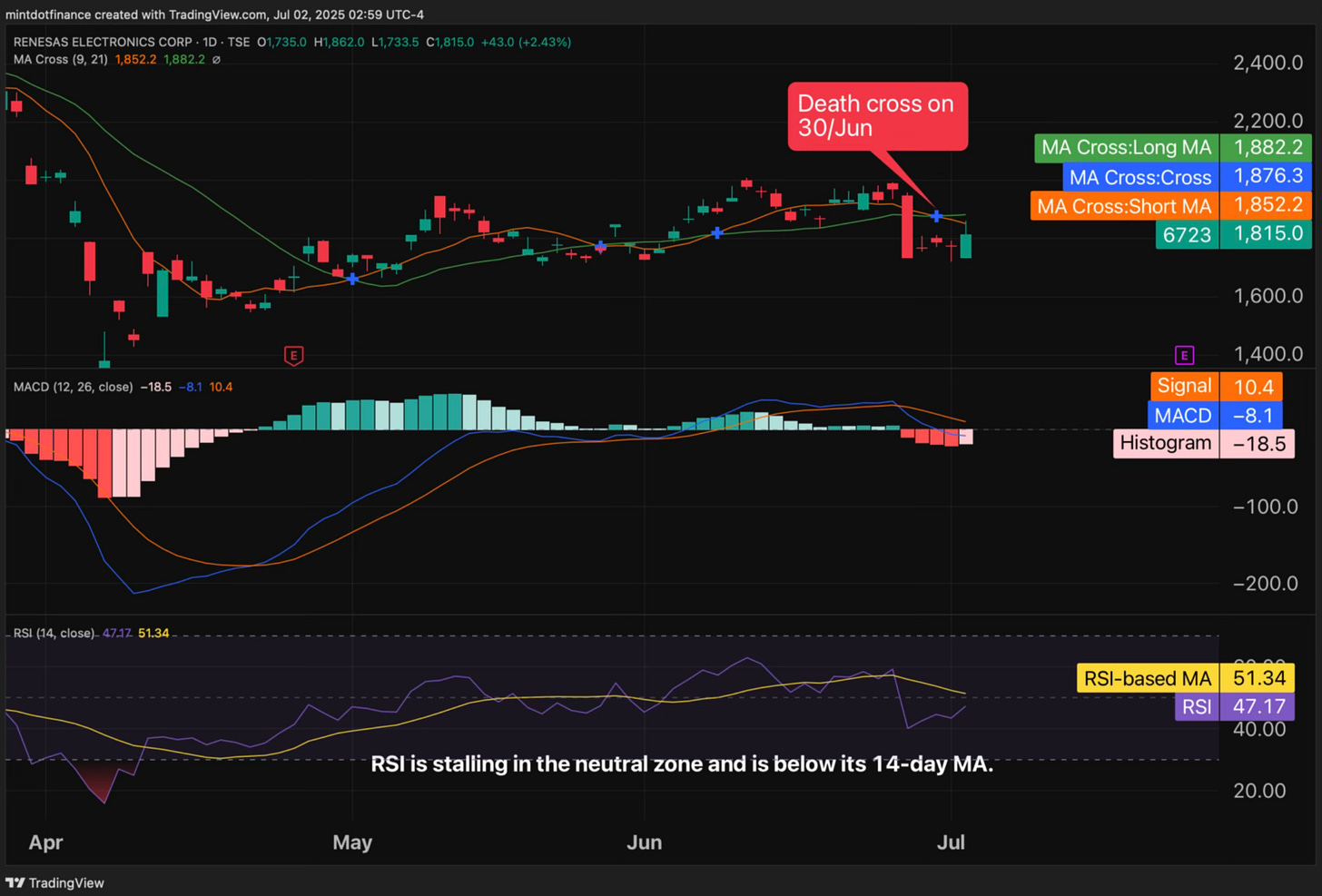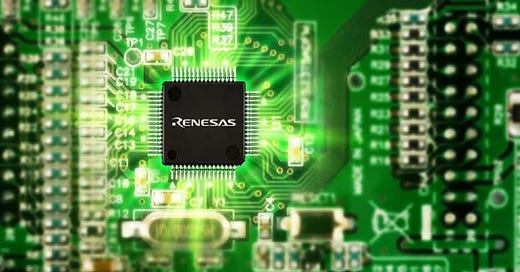Renesas in Reverse: Missed Milestones, Weak Demand, and a Costly Wolfspeed Gamble
Renesas delays key revenue targets, battles plunging chip demand, and absorbs a $1.7B hit from Wolfspeed’s collapse, emerging with deeper stakes but growing uncertainty ahead.
Renesas postponed its $20 Bn revenue goal to 2035 amid weak EV chip demand, triggering a 12% stock plunge.
Tepid EV growth, Chinese oversupply, and falling automotive and industrial chip sales slashed Renesas’ Q1 2025 net income by 67.4% YoY.
Renesas faces a $1.7 billion loss from Wolfspeed’s bankruptcy but gains a 38.7% stake, shifting from creditor to strategic shareholder in SiC technology.
Stalled Circuits: Renesas Faces Harsh Headwinds in the EV Chip Market
Once a bold contender in the global semiconductor race, Renesas Electronics is now grappling with the harsh realities of a shifting market landscape. The Japanese chipmaker sent shockwaves through investors after delaying its long-held ambition of hitting $20 billion in revenue, now pushed back to 2035 from the original 2030 timeline.

This strategic retreat follows a turbulent stretch marked by declining demand for automotive and industrial chips, particularly those tied to the slowing electric vehicle (EV) sector. In 2024, Renesas recorded revenue of ¥1.348 trillion (approximately $9.28 billion), underscoring how far it remains from its lofty target.
On July 5, 2023, Renesas and Wolfspeed revealed a long-term wafer supply deal, under which Renesas committed a $2 billion (USD) deposit. The agreement secured a 10-year supply of both bare and epitaxial silicon carbide (SiC) wafers from Wolfspeed. This partnership was intended to support Renesas in ramping up its SiC power semiconductor production beginning in 2025.
Renesas has recently shelved plans to manufacture SiC power chips, as lukewarm EV demand and a surge of low-cost Chinese supply have driven prices sharply lower. Still, the company isn’t stepping away from the SiC market altogether; it may shift focus to in-house chip design while outsourcing manufacturing to external foundries, ultimately selling the final products under its own brand.
Meanwhile, BYD is distancing itself from Renesas as it pivots toward domestic chip production, reflecting a broader shift among Chinese manufacturers. Local players are rapidly closing the technological gap by forging deep partnerships across industries and research institutions. These collaborations have significantly shortened development cycles, often by half, allowing them to bring competitive products to market faster and at lower costs. As a result, they are swiftly expanding their footprint in the mid- to low-end segments, challenging traditional suppliers with aggressive pricing and speed.
Declining demand for chips in key end markets i.e., automative and industrial have eroded the company’s earnings. Renesas felt the brunt of the slowdown in the last two quarters, with Q1 2025 net income down 67.44% YoY.

Renesas Converts Wolfspeed Debt into Equity Amid a Potential $1.7B Blow
Renesas’ troubles have taken a deeper turn. Wolfspeed, a critical partner in Renesas’ push into SiC technology, recently filed for bankruptcy, outlining a $4.6 billion creditor-backed restructuring plan. Among those creditors, Renesas stands out with a $2.1 billion exposure, stemming from a 2023 supply agreement under which it financed Wolfspeed’s SiC wafer operations.
In a strategic but costly move, Renesas had already agreed to convert this debt into a mix of convertible notes, equity, and warrants. With Wolfspeed’s formal bankruptcy filing, that conversion is now set to take effect, solidifying Renesas' transition from creditor to shareholder.
The immediate financial hit, however, is significant. Renesas expects to incur a loss of around ¥250 billion ($1.7 billion) from the restructuring. Yet despite the write-down, the deal will leave Renesas holding a sizable 38.7% stake in the restructured Wolfspeed. As the Japanese chipmaker absorbs this blow, it is also betting that deeper integration into Wolfspeed’s future may eventually pay off.
Technical Signals
Formation of a death cross on 30/Jun pushed prices lower. Currently, prices are below the 9 and 21-day MA, suggesting bearishness. Moreover, the MACD below the signal line reinforces the prevailing bearish bias.

Prices trade closer to the lower Bollinger band. Last week, buying pressure weakened significantly as indicated by the Accumulation/Distribution (A/D) indicator.

ATR based stop-loss points signals stop loss for long positions at 1,612.3 JPY (11.2% below the most recent closing price) and stop loss for short positions at 1,983.2 JPY (9.3% above the recent closing price).

Keep reading with a 7-day free trial
Subscribe to Mint Insights to keep reading this post and get 7 days of free access to the full post archives.






